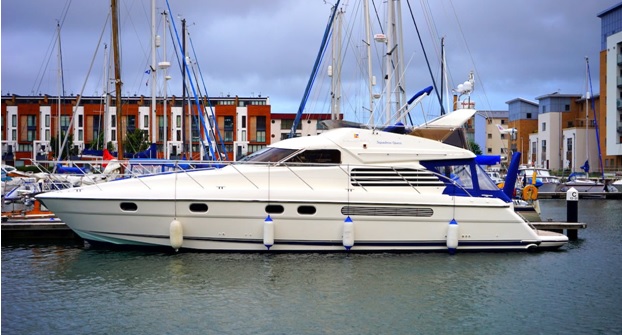Marine and Boat Electrical Safety Tips
25th May 2023
If there’s one environment on this planet that is not conducive to electrical systems and wiring, it’s on board a boat.
Marine environments subject electrical system components like switches and wires to extreme heat (in the engine compartment) corrosive chemicals (saltwater, oil, gasoline, etc.), and constant vibration, pounding, and movement.
Because of all these detrimental factors, marine electrical systems are suspect to all sorts of failures, some of which can be extremely dangerous.
With that said, here are some basic boating electrical safety tips to follow on the water to keep you and your family and friends safe.
Be cognizant of exposed cables and inspect them periodically, especially at connections points
Anywhere marine electrical cables come in contact with a structure or connection, or anywhere else they are exposed to the environment, they are at risk of failure.
For instance, cables that are exposed to the air will also be subject to seawater and sunlight, which can damage their insulation over time. Inspect all exposed cables periodically and hire a certified marine electrician to replace them as necessary.
One area to pay particularly close attention is to connections. This is where cables are most at risk of corrosion. Marine-grade battery wire is made of individually-tinned copper conductors that are corrosion-resistant, but if they do start to oxidize, that corrosion can travel up the wire, underneath the insulation, and cause shorts.
Eliminate chafing
According to a report from BoatU.S., more than half of all fires on board boats are caused by electrical wires or electrical failures.
One area in which exposed wires are at risk of causing fires is where they enter a structure. These entry points should be protected to protect against wire chafing, which is the leading cause of insulation failure, which itself is the leading cause of boat fires.
Wires should be protected at entry points with rubber grommets, sealed plastic collars, or sections of conduit. Even a little electrical tape is better than nothing - but consult a marine electrician, don’t make changes yourself.
Inspect switches, panels, fuses, and outlets
Most people associate exposed wiring with the risk of electrical shock (and it is) but some overlook the fact that exposed switches, panels, and outlets also present a risk.
If any of these components show signs of external damage or corrosion, get a marine electrician to replace them as soon as possible to reduce the risk of electric shock.
Use ABYC, USCG, UL-approved marine-grade battery wiring
When working with a boat’s electrical system, you should never use wire, parts, or components that are not expressly rated for marine use. The American Boat and Yacht Council, along with the United States Coast Guard and Underwriters Laboratory all set standards/guidelines for marine battery wire.
Marine-grade battery wire and cable are made of individually-tinned copper conductors that are very thin. Having a high strand count ensures that the cable remains flexible and the individual-tinning process helps protect the cable against corrosion.
Also, most marine-grade cables are usually resistant to weather, acids, alkalis, oil, gasoline, and abrasion, which help protect against chemical attack and chafing.
Never use frayed or damaged cords, and replace damaged electrical equipment as soon as possible
Frayed or damaged electrical wires, switches, and other electrical components present a significant risk of electrical shock and even if they are not within easy reach can still cause fires and explosions. Contact a marine electrical expert for repairs right away as soon as you discover any damage.
Do not run fuses continuously at their full ratings
Most fuses actually will not blow immediately even when run at their maximum amperage ratings. Some fuses will not blow until amperage exceeds more than 200% of their max rating.
This might sound like a good thing but it is actually an extreme safety risk, because if you run a circuit at 100% of its max conductor/fuse amperage rating, the fuse and conductor will heat up dramatically.
Thin wires can become extremely hot in under ten minutes when run at 100% of their amperage ratings, and fuse boxes can become hot so quickly that they can melt the fuse box.
This is a marked fire risk; there are two items that you should observe to prevent it. One is that you should never continuously run a circuit at 100% of its max rating, and the second is that you should use fuses and wires that have higher max ratings than you need. A good general observation is that you should use circuit protection and wires so that the current load does not exceed 80% of their max rating.
Never use wire of an inappropriate gauge (If an application calls for 8 AWG marine battery cable, use that or thicker wire)

As stated in the last section, using wire that is too small for an application will result in overheating and present a higher risk of electrical shock and fire.
Only use marine wire that is rated appropriately for the situation. If an application calls for 8 AWG marine battery cable, use that, or a thicker wire with a higher voltage and amperage rating.
Using low-amperage wire when a high amperage rating is necessary is extremely dangerous. Never do so, and always consult an electrical engineer if you have any questions.
Where possible, use only ignition-protected devices
Electrical systems are rated for specific applications, and some are ignition protected, but this respects the specific system.
For instance, diesel-powered boats may have electrical systems and components that are ignition-protected - but only onboard diesel-powered vessels.
Bringing gasoline on board a diesel-powered vessel, for instance, is extremely dangerous because the electrical systems on a diesel vessel are not rated for ignition protection in an environment that contains gasoline.
This is only a caution; if you have questions, consult the manufacturer or a marine electrical expert.
Never operate power tools or equipment in potentially explosive environments
Similarly, you should never operate power tools in potentially explosive environments. Many power tools, like electric drills and saws, are powered by brush-type or DC motors. When you operate them, they produce sparks; you can actually see this if you look inside the vents and run them.
As you can imagine, this can be extremely dangerous if you operate these power tools in situations in which explosive vapors, like gasoline or hydrogen gas, are present.
Shop vacuums, power drills, saws, and routers should never be operated on board vessels if there is a risk of explosive vapors present.

Have your boat’s electrical system inspected regularly by a certified marine electrician
Last but not least, you should periodically have a certified marine electrician inspect your boat’s electrical system to ensure it complies with all local and state regulations and safety codes, such as those prescribed by the NEC, ABYC, and NFPA.
High-Quality Marine Battery Cable Is Here
If you came here looking for high-quality 8 AWG marine battery cable, you’re in the right place. Our finely stranded boat wiring is highly flexible and insulated with a jacket that is resistant to acids, alkali, abrasion, gasoline, oil, and more. If you have any questions about it before buying, get in touch with us at 1-800-262-1598.

